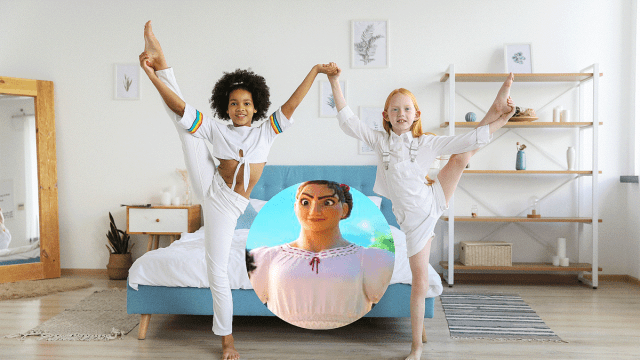We’re all aware of the societal pressures around body image. You might be surprised to hear, however, that even accomplished women athletes struggle: A survey of Division I student-athletes by ESPNW found that 68% of women athletes said they felt pressured to be pretty and 30% reported a fear of being “too muscular.”
Being small and beauty-obsessed is still the pervasive societal norm for anyone who’s not a boy. In fact, according to one survey of 1,000 participants, the ideal woman would stand about 5’5” and boast a 26-inch waist—about one-third less than the average woman’s waist size of nearly 38 inches.
That’s why Disney’s “Encanto” has such an important message for girls and non-binary children. While society still tells anyone who’s not a boy that being “too muscular” is a problem, “Encanto” presents Luisa’s strength as a gift that her physique reflects. She’s normalized, not portrayed as some oddity. Her strength allows her to contribute to her family and community in unique ways.
Why the World Needs More Luisas
It’s high time for children to see more of those representations because as long as current societal ideals about body image reign, girls and non-binary kids will continue losing confidence and missing out on important opportunities.
Building strength and embracing an athletic identity by participating in sports, for example, can help children build self-esteem along with leadership and communication skills. A 2020 study even found that 95% of women in the C-suite are current or former athletes. Yet girls drop out of sports two-to-three times more often than boys due largely to pressures to appear “feminine” instead of building the muscles and strength they need for success in athletics.
As the ESPNW study shows, these feelings persist even for those who stick with athletics until adulthood. Just one comment shaming girls for any portion of their physique can discourage them, and those comments are all too common. Even Olympian Simone Biles grew up being shamed for her body, covering up her muscular arms because other kids made fun of them.
And social media only exacerbates the issue. The endless feedback loop from likes and comments leads to new levels of self-doubt and body anxiety. It’s no wonder that 66% of teen girls on Instagram reported experiencing negative social comparison.
How to Encourage Your Daughters to Take up Space
No child or adult should get trapped into feeling inadequate because they’re strong or have unique physical gifts like well-defined quads or prominent biceps. And while parents of daughters and non-binary children might not be able to reshape the societal narrative entirely, they can help their children see encouraging representation and have positive experiences throughout their most formative years.
So how can you encourage your children to be more like Luisa and get comfortable taking up space?
1. Become a cheerleader for strong female characters.
Toy manufacturers have quite a bit of sway in how kids see the world. If the only doll a child ever sees is waif-thin, she may idolize and normalize an impossible-to-attain shape. Consider introducing your children to characters and toys that represent a more comprehensive range of sizes instead.
You don’t have to make a big deal about how a toy looks, either. Focus instead on the character’s internal or physical attributes. Remember: Luisa’s strength is framed as a non-issue from a stereotypical perspective. The drama lives separate from her muscularity.
2. Present kids with regular physical challenges.
In the U.S., just over one-third of teens participate in multiple sports. But engaging in many types of physical challenges can be mentally and physiologically beneficial. Not every child will be athletically inclined, but parents can present them with multiple options for physical activities to help them find their niche.
For example, have your child participate in one team sport every season or every other season. If no team sports seem to stick, look for opportunities for your children to challenge themselves, like swimming or rock climbing. The important thing is to help children find pride and value in what their bodies can do rather than how they appear. It’s no coincidence that girls who participate in sporting events tend to possess stronger self-esteem and are 16% less apt to stress about the way they look.
3. Emphasize women’s health and ability in your household.
What could be a better way to help your child feel good about being strong than to have conversations around sport-specific training, nutrition, and mental fitness?
Watch women athletes and talk about their careers. For example, Fiao’o Fa’amausili, former rugby player and New Zealand Black Ferns captain and the first woman to be named the Auckland Rugby Union president, follows a fitting acronym through all her endeavors. STRONG stands for “sharing the load, trusting your team, respecting your players, thinking about others first, allowing no negativity, and being a good communicator and a great listener.”
Other influential women in sports—like Naomi Osaka, entrepreneur and four-time Grand Slam singles champion, or Megan Rapinoe, captain of the United States National Team—can serve as excellent role models. Another is Mikaela Shiffrin, the American alpine skier who openly spoke about mental health as health during the 2022 Winter Olympics. The list of body-positivity heroes, coaches, and mentors goes on and on.
If you’re parenting older teens, consider discussing incidents of sexism in sports, such as when a FIFA commentator verbally dismissed the skills of a female linesman because of her gender. You might also recommend your child join social media groups that celebrate female sports role models for their work ethics, not their style or fashion. Be sure the visuals, video, and media they consume will reinforce the message you want to send.
Ultimately, you can influence how your kids feel when they look in the mirror. Teach them that, like Luisa, they never need to hold back. Superpowers can come in all forms—including harnessing the athletic identity to be strong, look strong, and smash their personal best on the field.











